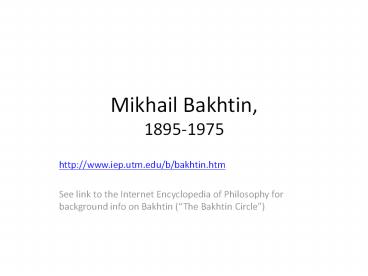Mikhail Bakhtin, 1895-1975 - PowerPoint PPT Presentation
Title:
Mikhail Bakhtin, 1895-1975
Description:
Mikhail Bakhtin, 1895-1975 http://www.iep.utm.edu/b/bakhtin.htm See link to the Internet Encyclopedia of Philosophy for background info on Bakhtin ( The Bakhtin ... – PowerPoint PPT presentation
Number of Views:1575
Avg rating:3.0/5.0
Title: Mikhail Bakhtin, 1895-1975
1
Mikhail Bakhtin, 1895-1975
- http//www.iep.utm.edu/b/bakhtin.htm
- See link to the Internet Encyclopedia of
Philosophy for background info on Bakhtin (The
Bakhtin Circle)
2
Bakhtins ideas today
- http//www.uwo.ca/french/bakhtin/
- Ongoing discussion of the relevance of his ideas
to our understandings of language and literature
- Widely cited in theories of language learning
- Most famous for his theory of dialogism
3
not a neutral medium
- Language, Bakhtin (1981) says,
- is not a neutral medium that passes freely and
easily into the private property of the speakers
intentions it is populatedoverpopulatedwith
the intentions of others. Expropriating it,
forcing it to submit to ones own intentions and
accents, is a difficult and complicated process
(p. 294).
4
Where do the words we learn come from?
- The word in language is half someone elses. It
becomes ones own only when the speaker
populates it with his sic own intention, his
own accent, when he appropriates the word,
adapting it to his own semantic and expressive
intention. Prior to this moment of
appropriation, the word does not exist in a
neutral and impersonal language (it is not, after
all, out of a dictionary that the speaker gets
his words!), but rather it exists in other
peoples mouths, in other peoples contexts,
serving other peoples intentions it is from
there that one must take the word, and make it
ones own (Bakhtin, 1981, p. 293-4).
5
taking others words and making them our own
- Speakers appropriate words from other peoples
mouths and other peoples contexts - Speakers struggle to accent these words with
their own intentions - But every word is furrowed from within with the
speech of others - Each word carries the history of its use
6
Bakhtins concept of the utterance
- language is realized in the form of individual
concrete utterances (oral and written) by
participants in the various areas of human
activity (1986, p. 60). - The utterance, not the sentence, is the unit of
analysis - The utterance ties thinking and speech together,
places language in the mouths of people talking
to each other, within particular situations. - Every utterance is a link in the chain of speech
communion (1986, p. 84).
7
Dialogic nature of language use
- Every utterance must be regarded primarily as a
response to preceding utterances (we understand
response here in the broadest sense) (Bakhtin
1986, p. 91, italics in original). - The utterance is by its nature dialogic
- The utterance is filled with dialogic
overtones, with echoes and reverberations of
other utterances (Bakhtin, 1986, p. 92).
8
Dialogism
- In the concrete instance of utterance
- traces and echoes of previous uses,
- the speakers plan as she anticipates response,
- the particular conditions of production all
intersect.
9
Addressivity
- The understanding that all language is addressed
(to someone, for an occasion ) - Within an utterance (written or spoken)
- traces of addressivity and the influence of the
anticipated response, dialogical echoes from
others preceding utterances, faint traces of
changes of speech subjects that have furrowed the
utterance from within (Bakhtin, 1986, p. 99).
10
heteroglossia
- This overpopulation of the utterance with the
voices of others is described in Bakhtins
concept of heteroglossia. - The speaker actively participates in the living
heteroglossia by imprinting her utterance with
her situated intent, and by appropriating and
ventriloquating words from others mouths
(Bakhtin, 1981, p. 272).
11
Language
- Is not a neutral medium (Bakhtin!)
- Is not an isolated system, but a dynamic, social
activity - Is a site of struggle over meanings
- Is dialogic (filled with previous meanings
anticipating response influenced by contexts of
use)
12
Baktins ideas about language
- In your own words, describe Bakhtins view of
language and/or define one of his ideas. - How might these ideas about language change the
way we think about teaching languages?


















![❤[READ]❤ Blood on the Stage, 1975-2000: Milestone Plays of Crime, Mystery, and Detection PowerPoint PPT Presentation](https://s3.amazonaws.com/images.powershow.com/10052439.th0.jpg?_=202406101112)








![⚡Read✔[PDF] Twenty One-Act Plays from Twenty Years of the Humana Festival: 1975-1995 PowerPoint PPT Presentation](https://s3.amazonaws.com/images.powershow.com/10083981.th0.jpg?_=20240723019)


![get [PDF] Download U.S. Marine Corps Unit Insignia in Vietnam 1961-1975: A Photographic Reference [PDF] PowerPoint PPT Presentation](https://s3.amazonaws.com/images.powershow.com/10122318.th0.jpg?_=202409061111)
